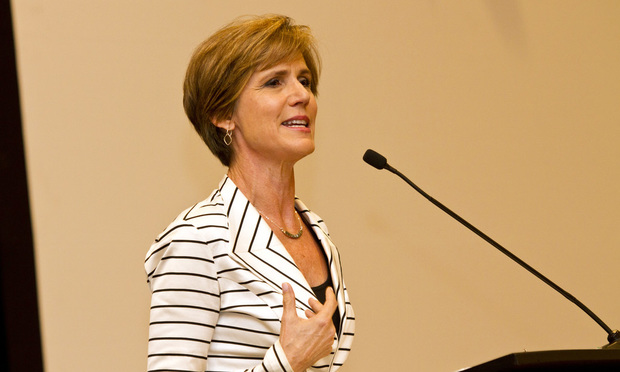Sally Yates Discusses the Original Trump Travel Ban, and What She Felt Compelled to Do
Yates explained to MSNBC podcast host Chuck Rosenberg why she thought it was more important to defy the president on the issue—leading to her firing—rather than simply resign.
May 30, 2019 at 06:09 PM
4 minute read
 Sally Yates, former U.S deputy attorney general. Photo: John Disney/ ALM
Sally Yates, former U.S deputy attorney general. Photo: John Disney/ ALM
Former Acting U.S. Attorney General Sally Yates, in a podcast interview this week, discussed why in 2017 she refused to allow DOJ lawyers to argue for President Donald Trump's original travel ban.
At the same time, she explained to MSNBC podcast host Chuck Rosenberg, himself a former U.S. attorney for the Eastern District of Virginia and the Southern District of Texas, why she thought it was more important to defy the president on the issue—leading to her firing—rather than simply resign.
"To defend this," said Yates, referring to the original Trump administration travel ban issued in January 2017 that applied to seven Muslim-majority countries, "I was going to have to send Department of Justice lawyers into court to take the position that this executive order had absolutely nothing to do with religion."
"And that's despite all the statements that the president made [about Muslims and certain countries], not just on the campaign trail, but statements he had made after that as well, after he was elected," Yates said.
"And that was in the face of the fact that this only applied to Muslim-majority countries, but yet provided priority for Christians in this instance," she said.
She would have to "send them [DOJ lawyers] in [to court] to advance a pretext," she also said, "and I don't think any lawyer should do that. And I sure don't think that Department of Justice lawyers should."
In the same lengthy interview on the new podcast, "The Oath with Chuck Rosenberg," Yates further said, "to me, doing something less than" outright refusing to defend the ban, such as resigning—"maybe that protects my personal integrity, but it's not protecting the Department of Justice. And as the acting attorney general I believe that that was my responsibility."
The quotes from Yates come from a transcript of the interview provided by MSNBC.
"The Oath" launched as a podcast on May 1, and according to MSNBC, it features Rosenberg—also a former acting head of the Drug Enforcement Administration, and currently an MSNBC legal analyst and a senior counsel in Crowell & Moring's Washington, D.C., office—having "unfiltered conversations" with former high-ranking U.S. government officials.
Early guests have included Preet Bharara, a former U.S. attorney for the Southern District of New York, and James Comey Jr., the former FBI director.
During this week's interview, Yates also spoke about being shocked that the original travel ban—Executive Order 13769—had come down while she was in the acting U.S. attorney general position. An Obama appointee, she only held the post for 10 days before being dismissed for insubordination.
She said that normally "there's another tradition … and that is that nothing happens during this time that you're serving as the acting attorney general."
I "learned [of the executive order] from my principal deputy from a phone call because he read on The New York Times website that the president had signed this travel ban," she said.
"There had been no interagency process that you would normally have to try to figure out what it is the administration is trying to accomplish, and how you could go about doing that," she added.
Suddenly, "we spent the weekend … trying to get our arms around what it was they [the administration] were trying to accomplish."
"This was travel ban one, we're on travel ban three now, but travel ban one actually applied to people, for example, who had valid visas and who were lawful permanent residents in our country. And so, we had lawyers who had to be in court that very next morning, Saturday morning [regarding the ban]."
"There were people who were literally in the air as the president signs this executive order that then were being turned away from the country when they landed here. … And then on Monday morning I learned that on Tuesday morning, the judge wanted the position of the Department of Justice on the constitutionality and the lawfulness of this executive order."
This content has been archived. It is available through our partners, LexisNexis® and Bloomberg Law.
To view this content, please continue to their sites.
Not a Lexis Subscriber?
Subscribe Now
Not a Bloomberg Law Subscriber?
Subscribe Now
NOT FOR REPRINT
© 2025 ALM Global, LLC, All Rights Reserved. Request academic re-use from www.copyright.com. All other uses, submit a request to [email protected]. For more information visit Asset & Logo Licensing.
You Might Like
View All


'You Became a Corrupt Politician': Judge Gives Prison Time to Former Sen. Robert Menendez for Corruption Conviction
5 minute readTrending Stories
- 1FTX One Year Later: The Impact on Examiner Practice in Bankruptcy Courts
- 2Gen AI Legal Contract Startup Ivo Announces $16 Million Series A Funding Round
- 3DOJ's Flawed Thinking in Challenging HPE-Juniper Merger
- 4Annual Self-Check: Testing For Bias On The Bench
- 5'None of Us Like It': How Expedited Summer Associate Recruiting Affects Law Students and the Firms Hiring Them
Featured Firms
Law Offices of Gary Martin Hays & Associates, P.C.
(470) 294-1674
Law Offices of Mark E. Salomone
(857) 444-6468
Smith & Hassler
(713) 739-1250







